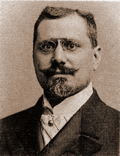Actors and their strategies
Ernesto Quesada (1858-1934), Argentinian publicist and friend of Oswald Spengler. Source: EcuRed, http://www.ecured.cu/Ernesto_Quesada
No ideas without people - taking this simple insight seriously means that we will have to interrogate biographies, social backgrounds and personal interests as well as the role of media and institutions to gain a differentiated understanding of intellectual exchange. To keep the research program grounded and managable, the school privileges the study of individuals, small groups and circles over that of whole milieus or social classes. For heuristic purposes, we distinguish between two types of actors:
-
Mediators and brokers
Individual experts and scholars, teachers and translators, but also groups and collectives such as the Dragomanes of the Ottoman empire or anarchist cells were often instrumental in getting ideas "across", disseminating and reshaping them for different purposes and audiences. We see the study of the agency of non-Western actors as a particular desideratum for global intellectual history, e.g. by attending to the relevance of alternative cultural resources and "South-South" contacts and exchanges. -
Translators and translation
Translation studies has taught us that the act of translation is a complex and creative intervention with the potential to transform semantic fields and whole languages. Next to the prototypical translation of texts - Voltaire into Arabian or Tagore into German - the school will also study interpreting and less clear-cut cases where linguistic codes interact as well as translation in the wider sense of the appropriation of cultural patterns and world views - and the actors involved.

